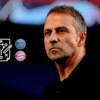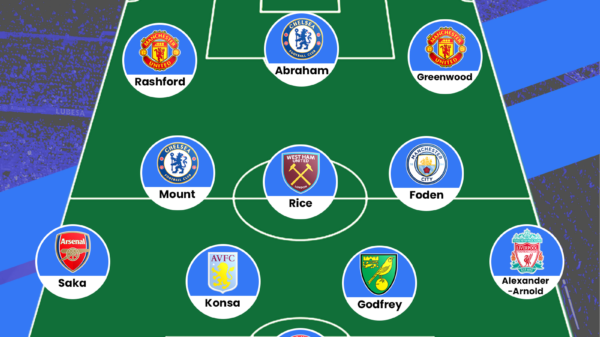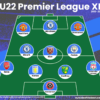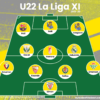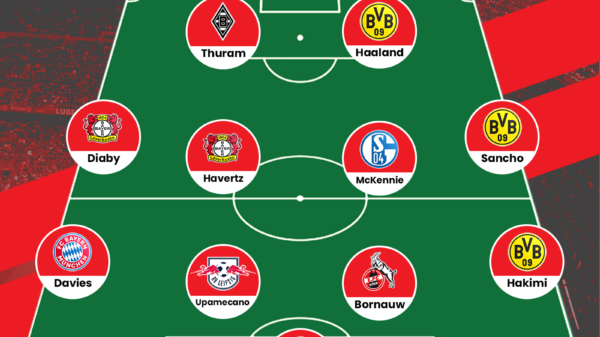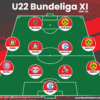For three clubs hailing from contrasting societies and footballing cultures, they have striking similarities. For one, each of them has a history immense enough to make any fan proud. They are still considered the most glamorous and instantly recognizable names of their respective leagues, not to forget the incredible comebacks they make time and again (Cue: UCL Final 1999, La Liga Season Finale 2006/07, UCL Final 2001). And of course, the fans resemble spoilt kids of rich parents who throw a tantrum when even one of their numerous toys (read trophies) is taken from them.

Yet, as the 2014/15 season draws to a close, these giants of football will only be partly satisfied with what they have achieved.
Old Trafford, which had become the Theatre of Nightmares last season, is presently heaving a sigh of relief at getting back into the top four, but the Red Devils are already wishing to return to the glory days of Sir Alex Ferguson. Los Merengues, on the other hand, will consider this season to be a failure as it ends trophy-less a year after they completed the long-awaited La Decima. For the Allianz Arena faithful, meanwhile, it looks like more of the same- a Bundesliga title everyone expects them to win, a Champions League semi-final exit and -surprise, surprise- questions over where exactly Pep is taking FC Bayern: forwards, backwards or (much like their passing) sideways.
As it so happens, the cure of their maladies might be similar in more ways than one- whether it be first-team management, their short-term futures or in the general direction of the clubs in the coming years.
URGENT MATTERS
Defensive Stability
Manchester United, since the heydays of Sir Alex, have been a counter-attacking team-a team that would absorb all the attack of the opposition, work hard together to win the ball back and on doing so, attack with deadly efficiency. Bayern Munich and Real Madrid had a similar approach and although Real relied more on individual skill rather than efficiency in attack, it acquired greater efficiency during Mourinho’s tenure.
Their game play at present, however, is markedly different. United under Dutch manager Louis van Gaal have become a possession-based team and have clocked possession upwards of 70% in some matches. Real Madrid too, have started to dominate matches by having a lion’s share of the ball, while Bayern’s manager is Pep Guardiola- enough said.
Such a style of play requires a different style of defending- one which is based more on defensive nous, skill, intelligence and quick decision-making rather than tireless running, brute force, bravery and flying tackles. Furthermore, the defenders should be comfortable in possession and have an eye for a long ball, with a leader among them to organize them, keep them alert and direct them in dire situations when majority of the players are committed forward.
Manchester United have been found the most wanting in this respect. The possession culture seems alien to them (as it does to most of England) and nowhere was this more evident than in the beginning of the season when the United backline would panic each time they lost possession. The result- 5 points from the first 5 games, sterile possession dictated by the fear of conceding and unnecessary sending-offs for Tyler Blackett, Chris Smalling and Wayne Rooney.
As the season progressed, the United defence became more assured, both in and without possession, although Smalling’s ball-playing abilities and Jones’ composure (oh, not that face again!) left a lot to be desired. More importantly, it showed United need a defensive leader- none of these two has shown either the desire or the aptitude for this role and Carrick, much as Red Devils would wish, wouldn’t be around forever. From within the squad, Daley Blind may technically be a replacement at Carrick’s position, but whether he has the personality and the presence to fulfil his role remains to be seen.
Real Madrid, on the other hand, have practically fielded three no. 10’s as a midfield trio for the majority of the season- Fiorentino Perez has, once again, succeeded in putting an extra layer of gold paint on the Bentley by selling the engine. This meant more possession and more creativity but also led to slow transition from attack to defence and ineffective shielding of Sergio Ramos and Pepe, who although being accomplished and experienced footballers themselves, can only do so much. The huge gaps between midfield and defence cost Real at various stages of the season against Real Sociedad, Valencia, Atletico Madrid and Juventus.
Bayern Munich, meanwhile, cannot complain about lack of personnel- a squad boasting the likes of Schweini, Lahm, Xabi Alonso and Boateng has no right to be defensively vulnerable, yet the losses to Wolfsburg, Monchengladbach, Porto and Barcelona must worry Die Roten fans who, just 2 years ago, saw their team win a treble starting from the back. Dante, the rock of that season, suddenly seems vulnerable to counter-attacks, Lahm and Schweinsteiger have not had the influence of yester-seasons through a combination of injuries and advanced midfield roles and Xabi Alonso is fast losing his legs, at least when it comes to running towards his own goal. The return of Javi Martinez and Badstuber might help but Pep, suffice to say, must be missing Puyol as much as, if not more than Messi.
Box-To-Box Midfielder
Manchester United’s association with any and every box-to-box midfielder since the transfer summer of 2013/14 are well-documented. It’s high time they finally get one this summer to add balance to the midfield, contribute in attack as well as defence, provide much-needed competition and cover to Herrera and Fellaini and of course, to let Wazza play upfront.
Real Madrid too need a tireless midfielder who runs up and down the pitch and actually possesses defensive awareness, unlike Isco and James. The injury of Luka Modric exposed their shortcoming in this position and was a major factor in derailing their season. A certain Paul Pogba showed them what they were missing in the UCL Semi-final, and although transfer rumours are unbecoming of any serious sports-writer, this one might just see the light of day.
Bayern Munich often fielded a midfield trio of Lahm, Alonso and Schweinsteiger in the latter half of the season- although highly gifted and experienced footballers, they are too similar and in a way, an anti-thesis of the present Real Madrid in that three defensive midfielders are playing together. Although this move was dictated by injuries and the return of ‘The Alaba’ will help speed up things, Pep might consider playing Muller in a more central role- a solution which, interestingly, is the opposite of what Real need in midfield.
Maybe the Toni Kroos- Xabi Alonso switch was not such a good idea after all, eh?
Role of Key Players
Louis van Gaal has praised Wayne Rooney’s captaincy, hailing the forward’s contribution in training and the dressing room as well as his versatility. Rooney’s role in the starting eleven, however, is still uncertain under ‘King Louis’. Initially deployed in a central midfield role where he seemed ineffective and in a sulking mood in general, his eventual positioning as a centre-forward co-incided with an upturn in Manchester United’s fortunes, but not necessarily his.
To compound problems, Angel di Maria, United’s new no. 7 who had initially instilled new hope of a mazy winger once again ruling Old Trafford, has fallen out of favour after a promising start. His deployment on the wings, in midfield, even as a second striker have all brought disappointing results and for LvG to mount a serious title challenge next season, the roles of messrs 7 and 10 need to be defined.
Cristiano Ronaldo has come a long way during his time at Real- a smooth metamorphosis from tricky winger to lethal goalscorer, which had started at United but completed at the Bernabeu, La Decima win for Los Merengues and two FIFA Ballon D’ors. Notwithstanding his achievements, maybe the time has come to revisit his role, and position, in the team. Presently playing as a left winger in a three man forward line, CR7 has, in Arrigio Sacchi’s words “Not gone past a player for 3 months now”. Although this is a harsh assessment of his contribution, a redefined role as a forward alongside Karim Benzema in a two-striker formation, or even as a lone forward must be on the mind of Carlo Ancelotti, who has already experimented with the former and yielded favourable results.
Gareth Bale, too, has been disappointing on the other side of the forward three, showing little instinct or agility for running past defenders towards goal. Often, he has been forced to run along the sideline and cross with his weaker foot. A prudent use of his strengths, which include his blistering pace and physical presence to beat defenders, a lethal left foot for crossing and shooting plus his contribution in defending the flanks, would greatly benefit Real.
After FC Bayern’s Champions League loss to Barcelona, several of the former’s past greats commented on the ills of their club; some blamed the transfer policy, others criticized the players’ attitude. Oliver Kahn, though had this to say-
‘Guardiola gives Gotze minutes when the game is already over,’ he said to ZDF.
‘They don’t take advantage of his talent.
‘[Thomas] Muller is playing in the wrong position as well. These problems, with two big players from Germany, must be resolved.’
Gotze’s earlier limited involvement could be explained by the lack of room for him in the playing 11; that excuse ended with Robben and Ribery both injured for large parts of the season. Guardiola has been unsure regarding Gotze’s position- he has played on the left side of midfield, on the left wing as a forward, and occasionally as a false 9, with Muller and Lewandowski on either side-but knowing Guardiola, maybe he was just experimenting. Whatever the case, the talent of Gotze is undisputed and the onus is on the manager to incorporate him into the first team, especially with Robbery on the wrong side of 30.
Muller’s case is more complicated, much like the player himself.
The Raumdeuter’s statistics for this year (20 goals, 18 assists) are similar to last year (26 goals, 15 assists). Statistics, though, only tell half the story and tactically speaking, Muller has usually operated as a second striker with Lewandowski this season, as opposed to playing on the right wing the previous season: this has led to him playing with his back to the goal more often and setting up goals rather than scoring them by stealthily moving into dangerous positions from the right wing.
Putting Muller as a forward has resulted in him losing his element of surprise: it is easier for defenders to mark him in a central position as opposed to the right flank from where he operates so effectively, much like a hybrid striker of the 21st century. Removing him from the ‘limelight’ into a withdrawn position (either on the wings or in central midfield) from where he can ‘investigate space’ at will, might go a long way in maximizing his potential and achieving greater goal tallies for the season, which he is perfectly capable of.
2 years on, Pep still has his work cut out.
FUTURE DIRECTION
New leaders in key positions
All of the great Manchester United teams of past have had inspiring leaders in key positions- whether it be the Holy trinity of 1960’s, Steve Bruce, Bryan Robson and Mark Hughes in the early 90’s, Schmeichel, Jaap Stam, Roy Keane and Cantona in the late 90’s or Rio Ferdinand, Nemanja Vidic, Paul Scholes and Ryan Giggs in the post-2003 era. More than any tactical adjustment, it is the presence of these personalities that has led to stirring comebacks time and again.
Real Madrid have had no less role models- players like di Stefano, Puskas, Pedro Casado, Butragueno, Manolo Sanchis, Michel and later Fernando Hierro, Raul and ‘San Iker’ Casillas were men teammates looked up to, especially in a losing cause.
Bayern Munich, too, have had footballers like Beckenbauer, Lothar Matthaus, Oliver Kahn and more recently Lahm and Schweinsteiger, for whom the team winning was greater than any individual accolade.
Such personalities are hard to find in their present teams. Manchester United have Wayne Rooney, but every other member of the team appears to be either cementing his own place or considering a move to another club. Real Madrid have Iker Casillas and Sergio Ramos, of whom the former’s powers are fast dwindling. Bayern Munich, on the other hand, seem to have several leaders on paper (Lahm, Neuer, Schweinsteiger, Alonso), but barring the German goalkeeper, these players are heading towards the twilight of their careers.
It is, therefore, of paramount importance that these three look for new leaders from within the new core of the team for the next four years- established players in their prime who, more than anything, care about the history, culture and fans of the club, command the respect of their teammates and have the authority to demand more from them at crucial junctures. At the end of the day, it is these players who show how special a club is and how meaningful football (sport, for that matter) can be.
Injection of youth
While players with experience and character can help guide a team, upcoming players from the youth system ensure healthy competition along with a strong team spirit within the squad. They also, as Sir Alex Ferguson said, are willing to run through brick walls for their team.
Real Madrid have been the biggest culprit in this aspect. The more experienced All-Whites fans would know what a home-grown team can achieve- their two most successful eras, from 1955-65 and in the 1980’s when la Quinta del Buitre ruled La Liga, were built on a core of players graduating from La Fabrica. In contrast, the present team can only boast of an ageing Casillas as a home-grown player. More importantly, several of the former youth academy players such as Juan Mata, Juanfran, Alvaro Morata, Roberto Soldado and Javi Garcia are plying their trade elsewhere, when they could easily have been important squad members, if not first-teamers. Among the present lot, only Jese Rodriguez and Nacho are even considered for being given game-time, while the likes of Jose Rodriguez, Marcos Llorente, Jack Harper and Alvaro Medran have been overlooked, even though there is a possibility of vacancy in their respective positions in the near future.
Meanwhile, Manchester United have been guilty of relying for too long on the laurels of the class of ’92. That era officially ended in 2014 with the retirement of Ryan Giggs and it is high time the youth system is rejuvenated. The signs have been encouraging- Louis van Gaal has handed first team starts to Tyler Blackett, James Wilson, Paddy McNair and Andres Pereira and if the past is anything to go by, LvG will have incorporated home-grown players in the United first team by the time he is done with them.
Interestingly, it was van Gaal who promoted youth academy players of Bayern Munich such as Muller, Badstuber and Alaba into the starting eleven. However, since his departure, Bayern have relied more on transfer signings, thus stifling the youth promotion culture. A well-assembled team, whose formation began as early as in 2007, with the purchase of Ribery and continued with the subsequent signings of Robben, Neuer, Dante, Martinez and Mandzukic, is now ageing and needs to be rebuilt; part of the solution may lie in the talents of the young upcoming players like Gianluca Gaudino, Pierre-Emile Hojberg, Sebastian Rode and Mitchell Weiser.
On a Final Note…
Manchester United, Real Madrid and Bayern Munich are at a cross-roads at this point in time-
- Reality has finally dawned upon Old Trafford: Sir Alex Ferguson has retired. More responsibility is needed at every level of management, including the Board of Directors, the manager, the youth coaches, the scouts and the senior players to fill the void left by Fergie. English football, too, is in danger of becoming obsolete and as a result, more foreign players, notably the Spanish contingent, need to be recruited. Manchester United, with their newfound possession style, might be the perfect catalyst to induce this change in not only English football, but English mentality as well.
- The Santiago Bernabeu celebrated the completion of La Decima last year, but what next? The reality is that Los Blancos have won 3 La Liga titles in the last 12 years and 1 in the last 7; for a period of 6 years from 2004 to 2010, they failed to get past the round of 16 in the UCL. Florentino Perez continues to implement his ‘Los Galacticos’ policy amid accusations of turning the club into an outlet for glamour and business rather than the beautiful game- a policy which is now losing its initial aura due to the phenomenal success of arch-rivals Barcelona, whose footballing philosophy crosses swords with the Galactico project. The fans are divided- some love the idea of world-class footballers gracing their team while others would much rather have a balanced team and, reminiscing the ‘80s, demand “less dollars, more cojones”.
- Die Roten too completed the treble in 2012-13 season and the following year, the German National Team, with a core of Munchen players won the FIFA World Cup. A journey which had begun after group-stage elimination at Euro 2000, leading to an overhaul of youth football by DFB and the clubs in tandem and culminating in a World Cup-winning squad, now feels complete for Germany and Bayern Munich. Greatness, though, lies in sustained success and Bayern Munich have to lead the way in nurturing this gifted generation of German footballers. It is for precisely this reason that they hired Pep Guardiola, a manager brought up in an entirely different footballing ideology, who was intended to provide a fresh perspective to their football. This process includes the danger of forgoing values and ideologies which made them successful in the first place (something Guardiola has been accused of frequently) and needless to say, the path ahead for FC Bayern resembles a tightrope walk- Adapt but retain, learn more but do not forget, be as good as you were and then still better.
The spotlight, for the time being, remains on the 3 traditional powerhouses of football. What they do now will decide their fate- will they remain great or, in Chris Martin’s words, sweep the streets they used to own?
Written by Shubham Ahuja
- Can Marco Verratti progress at PSG? - September 18, 2015
- What Allegri needs to do to cope with the losses of Andrea Pirlo, Arturo Vidal and Carlos Tevez - August 23, 2015
- Tactical Philosophy: Brendan Rodgers - July 8, 2015





















































